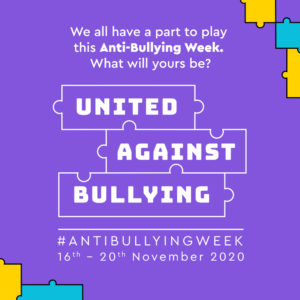
Anti-Bullying Week takes place 16th-20th November and the theme is united against bullying.
This year, more than ever, we’ve witnessed the positive power that society can have when we come together to tackle a common challenge.
Bullying can have a long lasting effect on those who experience and witness it. But by working together, we can reduce bullying. We all have a part to play in coming together to make a difference.
What is bullying?
Bullying is when someone uses their power to intimidate. Situations could be to humiliate, jealousy, or to get revenge or attention.
Bullying at work
Bullying at work can involve arguments and rudeness but it can also be more subtle. Other forms of bullying include:
• Excluding and ignoring people and their contribution
• Overloading people with work
• Spreading rumours
• Unfair treatment
• Picking on or regularly undermining someone
• Denying someone’s training or promotion opportunities
What is the Trust doing?
CNTW does not tolerate bullying or harassment and is actively working towards a culture free from these behaviours. We recognise that this will take more than a week to embed this and are working with key stakeholders to identify and challenge bullying behaviours, to enable people to speak up and to make lasting changes.
What can I do?
Don’t be ashamed to tell people what’s going on. You need to let people know what’s happening so they can help you. By sharing experiences you may discover that it’s happening to others too.
Seek advice and support
We recognise that it can feel intimidating to speak up or to ask for advice, so there are a range of ways you can do so in a way that feels most accessible to you. You can talk to:
• Your manager
• Our Freedom to Speak Up Guardian Neil Cockling ([email protected]/07810528169)
• Your Workforce representative
You may wish to speak to someone external to the Trust for support or advice. This could be:
• Your trade union representative or a representative from your professional organisation
• Our confidential Employee Assistance line, through PAM Assist
• ACAS (Advisory, Conciliation and Arbitration Service) helpline
Stay calm
Recognise that criticism or personal remarks are not connected to your abilities. Try to talk to the person and tell them that you find their behaviour unacceptable. They may not realise how their behaviour has affected you.
Keep a diary
This is known as a contemporaneous record. This is useful is you decide to take action at a later stage.
The Law
Bullying is not against the law, but harassment is. This when the unwanted behaviour is related to one of the following protected characteristics; age, disability, gender, gender reassignment, marriage and civil partnership, pregnancy and maternity, race, religion or belief, and sexual orientation.
Trust Policy
More information on how CNTW approach Bullying and Harassment can be found in the Dignity and Respect at Work policy, found here: https://www.cntw.nhs.uk/about/policies/dignity-respect-work-policy/
